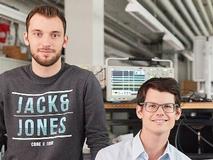Startups Developing Greenhouse Filters with Nano-Coatings, AI and Automation for Marketing, Energy Autonomous Biosensors, Contactless Robotic Grippers and an Integrated Eyesight Shading Device Each win CHF 10,000.
26.06.2020
Infrascreen, Meloncast, Mithras Technology, No-Touch Robotics, and ShadeMe Teams win Venture Kick’s first stage of financial and entrepreneurial support. Their projects increase the energy efficiency of greenhouse manufacturers, enable marketers to generate better leads, use body heat to charge electronic devices anywhere, save time and money to industrials thanks to contactless robotic grippers for small and fragile objects, and increase the comfort of modern buildings occupants thanks to a novel automatically adjusted shading device.
1.jpg) |
 Infrascreen CEO Henri de Lalande and CTO Benoit de Combaud
|
 Meloncast CEO Sven Boesinger, CMO Raphaela Kurer, Tech Lead Niroj Mahalingam, Data Science Lead Robert Gwadera, and UI/UX Lead Fabrizio Fracassi
|
 and Franco Membrini CEO_VK300.jpg) Mithras Tehcnology CTO Moritz Thielen (left) and CEO Franco Membrini
|
 No-Touch Robotics CTO Marc Röthlisberger and CEO Marcel Schuck
|
 ShadeMe CEO Yujie Wu
|
Infrascreen: Greenhouse filters using nano-coatings
Greenhouses are the key to a future where vegetables, fruits and flowers are grown sustainably. Infrascreen unlocks this vision by using nanotechnologies to drastically improve the financial and environmental performance of greenhouses. Together with the CSEM under the direction of Pr. Christophe Baillif from EPFL, Infrascreen's CEO Henri de Lalande and CTO Benoît de Combaud have developed a thin film used in the manufacturing of greenhouse climate control equipments. As of today, they have demonstrated the proof of concept of their product in lab conditions. The team estimates a total addressable market superior to 500 million CHF / year. They plan to use Venture Kick funds to pursue through the R&D phase and to initiate formal collaboration with the Wageningen University in the Netherlands. www.infrascreen.com
Mithras Technology: Body Heat to charge electronic devices anywhere
Greenhouses are the key to a future where vegetables, fruits and flowers are grown sustainably. Infrascreen unlocks this vision by using nanotechnologies to drastically improve the financial and environmental performance of greenhouses. Together with the CSEM under the direction of Pr. Christophe Baillif from EPFL, Infrascreen's CEO Henri de Lalande and CTO Benoît de Combaud have developed a thin film used in the manufacturing of greenhouse climate control equipments. As of today, they have demonstrated the proof of concept of their product in lab conditions. The team estimates a total addressable market superior to 500 million CHF / year. They plan to use Venture Kick funds to pursue through the R&D phase and to initiate formal collaboration with the Wageningen University in the Netherlands. www.infrascreen.com
Meloncast: AI and automation for Marketing
The competition for customer attention is fierce and more and more fought on the battlegrounds of content marketing. Annually over two hundred billion USD are spent globally on content marketing but 60% of all produced digital content is irrelevant and has no impact. Machine learning can dramatically improve the targeting and creation of marketing messages. With the marketers’ success in mind, Sven Boesiger, PhD. candidate from the University of St. Gallen, and Raphaela Kurer, ex. CMO of an Insurtech startup founded Meloncast, a Spin-Off of the University of St. Gallen. The team of five, consisting of data scientists and marketing specialists, works on a SaaS solution that helps marketers optimize their content marketing and thereby reduces their marketing costs. Meloncast achieves this by providing marketing managers with dynamic relevant topics for their specific target groups and automatically generated marketing messages with the help of state-of-the-art BERT and GPT-2 based machine learning models. Up until now, Meloncast has built a working prototype and is running proofs-of-concept with five companies from the financial sector (e.g. St. Galler Kantonalbank and Baloise). There are no competitors that provide a comparable out-of-the-box solution. Meloncast estimates that the total addressable market for this kind of content marketing solution amounts to seven billion USD. They plan to use the funds from the VentureKick to improve their language models and further automate their prototype. www.meloncast.com
The competition for customer attention is fierce and more and more fought on the battlegrounds of content marketing. Annually over two hundred billion USD are spent globally on content marketing but 60% of all produced digital content is irrelevant and has no impact. Machine learning can dramatically improve the targeting and creation of marketing messages. With the marketers’ success in mind, Sven Boesiger, PhD. candidate from the University of St. Gallen, and Raphaela Kurer, ex. CMO of an Insurtech startup founded Meloncast, a Spin-Off of the University of St. Gallen. The team of five, consisting of data scientists and marketing specialists, works on a SaaS solution that helps marketers optimize their content marketing and thereby reduces their marketing costs. Meloncast achieves this by providing marketing managers with dynamic relevant topics for their specific target groups and automatically generated marketing messages with the help of state-of-the-art BERT and GPT-2 based machine learning models. Up until now, Meloncast has built a working prototype and is running proofs-of-concept with five companies from the financial sector (e.g. St. Galler Kantonalbank and Baloise). There are no competitors that provide a comparable out-of-the-box solution. Meloncast estimates that the total addressable market for this kind of content marketing solution amounts to seven billion USD. They plan to use the funds from the VentureKick to improve their language models and further automate their prototype. www.meloncast.com
Mithras Technology: Body Heat to charge electronic devices anywhere
Wearables like smartwatches, activity trackers, headphones, and a growing number of medical and point-of-care devices have limited batteries life and depend on constant reliable energy supply. The human body heat can be converted into electricity by thermoelectric generators and used as a source of energy to meet the local demand of everyday electronic devices. Mithras Technology, an ETH Zurich spin-off founded by CEO Franco Membrini and CTO Moritz Thielen, develops the first cost-efficient technology able to exploit this form of decentralized energy generation. Mithras' miniaturized thermoelectric generators are able to harvest body heat. Users of portable and wearable devices will have the opportunity to extend the battery life of energy demanding devices and to remove the need of battery replacement and recharging for energy efficient devices and make them fully autonomous. For now, the team has built their first prototypes and their innovation received the European Union's Seal of Excellence, along with the attention of many international device manufacturers. The financing from Venture Kick will directly flow into the MVP development project and into building the first energy autonomous biosensor by spring 2021. mithras.tech/
No-Touch Robotics: contactless robotic grippers for small and fragile objects
Conventional robotic grippers are limited in their ability to handle small and fragile components. By using acoustic levitational forces, ETHZ spin-off No-Touch Robotics, co-founded by CEO Marcel Schuck and CTO Marc Röthlisberger, develops damage and contamination free contactless robotic grippers for handling fragile objects. With this technology, prospect customers in watchmaking, micromechanics, and the semiconcductor industries can save time and money by using the same gripper for a variety of object shapes. They can further improve product quality, yield, and their environmental footprint. No-Touch Robotics will sell grippers that can easily be integrated into existing production lines and will provide design-in services. There is currently no other technology in the market that can provide contactless gripping for various object shapes. The Venture Kick financing will be used to develop the technology further to serve a broader range of applications and secure the respective IP. www.notouchrobotics.com
Conventional robotic grippers are limited in their ability to handle small and fragile components. By using acoustic levitational forces, ETHZ spin-off No-Touch Robotics, co-founded by CEO Marcel Schuck and CTO Marc Röthlisberger, develops damage and contamination free contactless robotic grippers for handling fragile objects. With this technology, prospect customers in watchmaking, micromechanics, and the semiconcductor industries can save time and money by using the same gripper for a variety of object shapes. They can further improve product quality, yield, and their environmental footprint. No-Touch Robotics will sell grippers that can easily be integrated into existing production lines and will provide design-in services. There is currently no other technology in the market that can provide contactless gripping for various object shapes. The Venture Kick financing will be used to develop the technology further to serve a broader range of applications and secure the respective IP. www.notouchrobotics.com
ShadeMe: integrated Eyesight shading device
Modern buildings tend to have large windows, however, occupants have to suffer from discomfort glare from the sun and overheating in buildings. ShadeMe founder Yujie Wu, PhD at EPFL, has invented a novel decentralized shading device to automatically adjust shading to the optimal position offering comfortable daylight according to dynamic sky conditions. This well-designed system provides a properly controlled amount of daylight according to the varying weather conditions. This has significant potential in contributing to human’s health and productivity, reducing energy consumption, while keeping visual comfort. The controller is based on the monitoring of sky luminance distribution and real-time lighting simulation. The novel design reduces the complexity in installation and commissioning, since sensors and controllers are completely integrated in the shading device. Two PCT patents have been filed to protect both the hardware and software. The total solar shading market is about 3 billion USD and the smart shading market reaches 800 million USD at the moment which anticipate an 50% annual increase in the following five years. Yujie Wu plans to use the Venture Kick funds to improve the marketing with a video clip and the website.
Modern buildings tend to have large windows, however, occupants have to suffer from discomfort glare from the sun and overheating in buildings. ShadeMe founder Yujie Wu, PhD at EPFL, has invented a novel decentralized shading device to automatically adjust shading to the optimal position offering comfortable daylight according to dynamic sky conditions. This well-designed system provides a properly controlled amount of daylight according to the varying weather conditions. This has significant potential in contributing to human’s health and productivity, reducing energy consumption, while keeping visual comfort. The controller is based on the monitoring of sky luminance distribution and real-time lighting simulation. The novel design reduces the complexity in installation and commissioning, since sensors and controllers are completely integrated in the shading device. Two PCT patents have been filed to protect both the hardware and software. The total solar shading market is about 3 billion USD and the smart shading market reaches 800 million USD at the moment which anticipate an 50% annual increase in the following five years. Yujie Wu plans to use the Venture Kick funds to improve the marketing with a video clip and the website.


